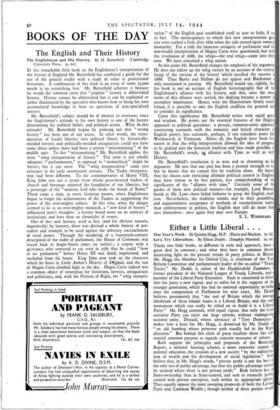BOOKS OF THE DAY
The English and Their History
IN this remarkable little book on the Englishman's interpretation of the history of England Mr. Butterfield has combined a guide for the use of the general reader with a study of value to professional historians. A combination of ihis kind in an essay of some 35,000 words is an astonishing feat. Mr. Butterfield achieves it because he avoids the common error that " popular " history is abbreviated history. History cannot be abbreviated but it can be explained or rather illuminated by the specialist who knows how to bring his own accumulated knowledge to bear on questions of non-specialised interest.
Mr. Butterfield's subject should be of interest to everyone, since the Englishman's attitude to his own history is one of the factors determining his political beliefs and political action. . What l's.this attitude? Mr. Butterfield begins by pointing out that "wrong history" has been one of our assets. In other words, the trans- mutation of feudal liberties into political liberty by historically- minded lawyers and politically-minded antiquarians could not have come about unless there had been a certain " misconstruing " of the middle ages. To this " misconstruing " Mr. Butterfield applies the term "whig interpretation of history." The term is not wholly adequate (" parliamentary," as opposed to " monarchical " might be better), but it can serve. The "whig interpretation" came into existence in the early seventeenth century. The Tudor interpreta- tion had been different. To the contemporaries of Henry VIII, King John was not a tyrant from whom great-hearted leaders of church and baronage extorted the foundation of our liberties, but a prototype of the "majestic lord who broke the bonds of Rome." There came a time, as every historian knows, when Englishmen began to forget the achievements of the Tudors in suppressing the power of the over-mighty subject. At this time, when the danger seemed to lie in an over-mighty monarch, a "new kind of history" influenced men's thoughts : a history based more on an analysis of institutions and laws than on chronicles of events.
Out of this new history, used at first (and for obvious reasons, imperfectly) by lawyers, there was devised a whole battery of pre- cedent and example to be used against the arbitrary encroachment of royal power. Through the misdating of a fourteenth-century description of the order of parliament, the House of Commons was traced back to Anglo-Saxon times (or earlier) ; a sceptic with a grievance, who ventured to say even in 158z that he could "hear of no parliament" before Henry III was fined, imprisoned, and excluded from the house. King John now took on the character which he bears in Little Arthur's History of England, and the sun of Magna Carta climbed high in the sky. Magna Carta indeed was a common object of veneration for historians, lawyers, antiquarians and politicians, and, with the Petition of Right, the "whig interpre- tation " of the English past established itself as true to faith, if n to fact. The extravagances to which this new interpretation gay rise were curbed a little after i66o when the tide turned again towards monarchy. For a tit& the immense antiquity of parliament and the non-feudal interpretation of Magna Carta were questioned, but with the revolution of 1688, the whigs—the real whigs—came into their own. We have remained a whig nation.
At this point Mr. Butterfield changes the emphasis of his argument He does not follow up the whig victory by an account of the crystal- lising of the version of the history whiclr justified the success of i688. Thus Burke and Hallam do not appear and Blackstone is only mentioned in passing. Mr. Butterfield would say, rightly, th his book is not an account of English historiography but of the Englishman's alliance with his history, and that, once the main terms of this alliance were settled, the drafting became a matter of secondary importance. Hence, with the Hanoverians firmly estab- lished, it is possible to take the English tradition for granted and to consider its significance.
Upon this significance Mr. Butterfield writes with equal grace and wisdom. He points out the essential features of the English approach to political questions : a prosaic, common-sense approach contrasting curiously with the, romantic and lyrical character of English poetry, less curiously, perhaps, if one considers poets like Wordsworth or Tennyson. Above all, the English have been for- tunate in that the whig interpretation allowed the idea of progress to be grafted into the historical tradition and thus made possible, in Mr. Butterfield's words, ale alliance with Time as well as with History.
Mr. Butterfield's conclusion is as wise and as charming as his
argument. He sees that our past has been a present strength to us, but he knows that we cannot live by tradition alone. He knows that the classes now exercising ultimate political control in England may have reason to be less patient, less comprehending of significance of the "alliance with time." Certainly some of the guides of these new political masters—for example, Lord Beaver- brook or Mr. Low—have failed hitherto to grasp the English tradi- tion. Nevertheless, the tradition stands, and in their grumbling and argumentative acceptance of methods of reconciliation rather than embitterment in politics, the English may still do more than save themselves : once again they may save Europe.
E. L. WOODWARD.


























 Previous page
Previous page